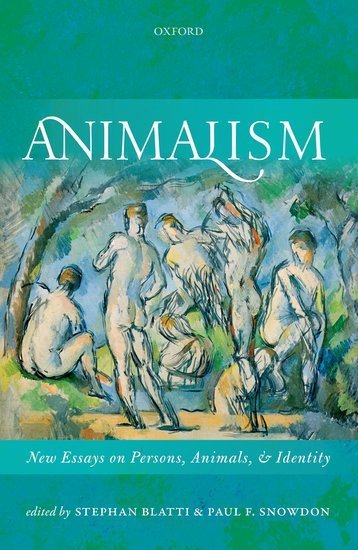in print: books
“a thoughtful collection of essays that show the healthy state of the current debate about our identity and nature.”
“This book will give you a great sense of the ongoing conversation about animalism. This conversation has been around for a while. So the trenches are dug deep; no one is giving a whole lot of ground. Yet it’s still a rich and interesting conversation about a question that concerns us all: What are we?”
ANIMALISM
Stephan Blatti & Paul Snowdon, ed. / Oxford University Press, 2016
What are we? What is the nature of the human person? Animalism has a straightforward answer to these long-standing philosophical questions: we are animals. After being ignored for a long time in philosophical discussions of our nature, this idea has recently gained considerable support in metaphysics and philosophy of mind. It has also, amongst philosophers, occasioned strong opposition, even though it might be said to be the view assumed by much of the scientific community. Animalism: New Essays on Persons, Animals, & Identity is the first volume to be devoted to this important topic and promises to set the agenda for the next stage in the debate.
Containing mainly new papers as well as two highly important articles that were recently published elsewhere, this volume's contributors include both emerging voices in the debate and many of those who have been instrumental in shaping it. Some of their contributions defend animalism, others criticize it, still others explore its more general implications. The book also contains a substantial introduction by the editors explaining what animalism is, identifying leading issues that merit attention, and highlighting many of the issues that the contributors have raised.
“This volume is the first of its kind: a collection of articles focusing specifically on the Animalist theory of personal identity. ... It is essential reading for anyone working on personal identity, and should be read by anyone interested in the fundamental question as to what kind of thing we human persons are. ... Animalism is a superb collection, packed full of excellent chapters. To anyone interested in Animalism and related topics, this book could not be more highly recommended.”
“This is a well-curated collection that both addresses long-standing issues in the animalist debate and reveals new facets of them. It is clear enough for those who are new to the conversation and deep enough for those who are not.”
ONTOLOGY AFTER CARNAP
Stephan Blatti & Sandra Lapointe, ed. / Oxford University Press, 2016
“This excellent volume is a must-read for those curious about recent work in ontology and metaontology, and the Carnapian turn that it has taken.”
Analytic philosophy is once again in a methodological frame of mind. Nowhere is this more evident than in metaphysics, whose practitioners and historians are actively reflecting on the nature of ontological questions, the status of their answers, and the relevance of contributions both from other areas within philosophy (e.g., philosophical logic, semantics) and beyond (notably, the natural sciences). Such reflections are hardly new: the debate between Willard van Orman Quine and Rudolf Carnap about how to understand and resolve ontological questions is widely seen as a turning point in twentieth-century analytic philosophy. And indeed, this volume is occasioned by the fact that the deflationary approach to metaphysics advocated by Carnap in that debate is once again attracting considerable interest and support.
Containing eleven original essays by some of today's leading voices in metametaphysics, Ontology After Carnap aims both to deepen our understanding of Carnap's contributions to metaontology and to explore how this legacy might be mined for insights into the contemporary debate.
THE LIVES OF HUMAN ANIMALS
Stephan Blatti, ed. / Spindel Supplement, Southern Journal of Philosophy, 2014
The theme of the 32nd annual Spindel Conference was “The Lives of Human Animals.” Under the direction of Stephan Blatti, the conference focused on the animalist theory of personal identity. On this view, our fundamental nature is given not by our psychological capacities, but by our biological constitution: we are primates (Homo sapiens), and like all organisms, we persist just in case we continue living. This view stands opposed to the standard Lockean account, according to which our fundamental nature is given by our status as self-conscious, rational agents ("persons") and the conditions under which we persist through time and change are to be accounted for in terms of psychological continuity.
The aim of this conference was to encourage a broader engagement with animalism by providing a forum in which metaphysicians and philosophers of mind working on animalism could interact with interested thinkers from outside those areas, including philosophy of biology, ethics, philosophical psychology, and philosophy of religion. Besides animalism in its own right, among the topics explored in these proceedings were the nature of organic life, the metaphysics and ethics of death, issues in animal cognition, animal interests, and the afterlife.


